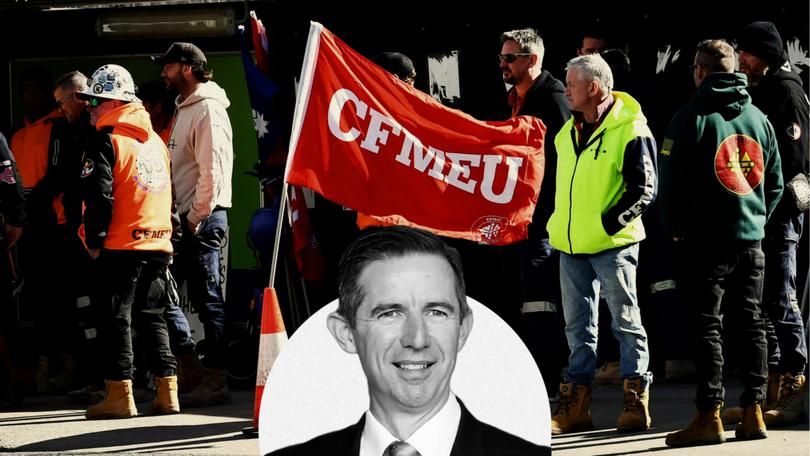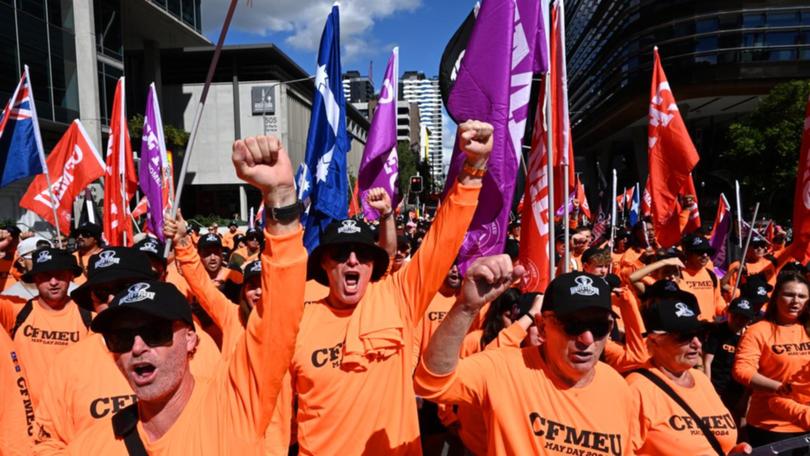SIMON BIRMINGHAM: CFMEU brings shame on other unions and is a cancer on our national economy
SIMON BIRMINGHAM: Elements of the union movement have become indistinguishable from the powerful vested interests they were established to fight against.

You might not expect a Liberal say this, but trade unions have contributed to many good and important things.
We should be thankful for their role in helping to deliver fair pay and conditions for a hard day’s work.
Thankfully, we’ve come a long way from times of servitude and children being sent down a mine shaft.
Sign up to The Nightly's newsletters.
Get the first look at the digital newspaper, curated daily stories and breaking headlines delivered to your inbox.
By continuing you agree to our Terms and Privacy Policy.Australian workers enjoy some of the best workplace conditions in the world, with strong legal underpinnings of workers’ basic rights.
Along the way though, unions have become much more than a collective of workers standing in solidarity against egregious workplace practices.
Australia’s unions have used advances in workers’ rights to also establish legal rights of their own, legal protections for themselves and vast influence through political and financial means. Union staff are now frequently professional unionists, often far detached from the work of those they represent.
Great political power has been seized through the Australian Labor Party, which is basically owned by the trade union movement. Unions collectively dominate Labor’s executive, its staff, its preselections and its parliamentary membership.
Unions are overwhelmingly Labor’s biggest donors and, in those States where election spending limits apply to parties, unions happily avoid the limits to campaign directly for Labor themselves.
Not only have unions themselves built up huge financial capabilities, but through industry superannuation funds unions appoint directors to oversee $1.3 trillion in investments of Australians’ retirement savings. And yes, that did say trillion, it’s not a typo.
The facts speak for themselves: parts of the union movement have morphed into something more akin to the powerful vested interests they were established to fight against.
Victorian-era historian Lord Acton wrote that “power tends to corrupt and absolute power corrupts absolutely”. There is no better example of Acton’s truism than Australia’s construction union, the CFMEU.
The lawlessness, standover tactics and thuggishness of the CFMEU have been well-documented for all too long.
Judge after judge in court cases around the nation has found the CFMEU or its officials guilty. Yet the fines and penalties were seen by a rich and powerful union as the price of doing business.
Too many big businesses decided that yielding to CFMEU demands was also the price of doing business, rather than running the multitude of risks that would come with standing up to them.
Most Australians aren’t associated with the construction sector. As Aussies battle away with the cost of living and other daily pressures, most people probably think that the debate around the CFMEU doesn’t matter much to them. But they’re wrong.

Every Australian pays the price of the CFMEU’s militancy. Take just a few examples of where you, your family or neighbours may be negatively impacted:
- Australia’s economy is weaker thanks to the lower productivity caused by CFMEU tactics.
- Government spending - and therefore taxes - are higher because of the additional costs of building public infrastructure driven by the CFMEU.
- Delays in the construction of both public and private buildings are commonplace due to CFMEU shutdowns, slowdowns and stand-over tactics.
- Innocent businesses have been pushed to bankruptcy because they wouldn’t play by the CFMEU’s modus operandi of bribes and kickbacks.
- Self-employed tradies get kicked out of building sites if they refuse to sign up to or go along with CFMEU demands.
- Higher costs and big delays mean that critical public services like hospitals, schools and roads just don’t get built when they’re needed.
- Inefficiency in the wider construction sector makes housing costs and shortages even more acute for everyday Australians trying to put a roof over their head.
- Private investors take money to other countries once they’ve factored in the risks of doing business in Australia where the CFMEU are in control of the construction sector.
- Additional construction costs drive higher inflation, higher interest rates and lower disposable income for Australian households.
- The corrupting influence of the CFMEU over superannuation fund investments or decisions risks average Australians’ returns on retirement savings.
This is why real action is needed to clean up this and other corrupted parts of the union movement.
Sending an administrator into the CFMEU, as Anthony Albanese has announced, is a weak and inadequate response. This union has crossed too many lines and representation for construction workers needs to be rebuilt from the ground up.
Bob Hawke had the guts to deregister the old Builders Labourers’ Federation. Despite the $6.4 million in donations to Labor from the CFMEU since Albanese became leader, he needs to channel Hawke and show strength.
The CFMEU long ago lost any moral right to the protections and entitlements of being a registered union. It brings shame on other unions and is a cancer on our national economy.
Albanese needs to learn from Hawke. Forty years since Hawke took strong action, Australia finds itself with similar problems in the same industry sector. That necessitates other structural changes too.
Unions are entitled to do their job, but where power is bestowed, special scrutiny is essential. It is clear that the scrutiny of a powerful union like the CFMEU has been insufficient and the penalties inadequate, which has allowed improper, immoral, corrupt conduct to flourish.
Albanese’s next steps will be telling. Will he show strength in the face of powerful vested interests, as the original trade unions did? Or will our Prime Minister allow those with power to continue abusing it, as those first unions fought against? His resolve to date doesn’t offer much hope.
Simon Birmingham is the shadow foreign affairs minister.
